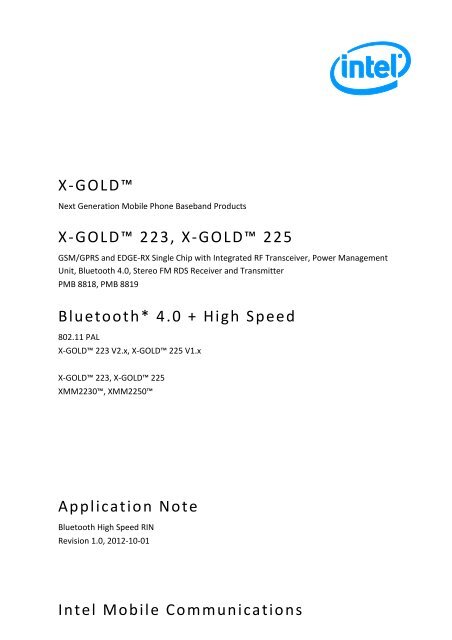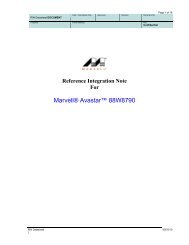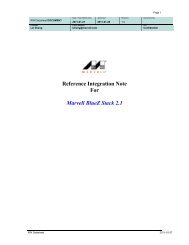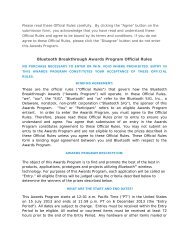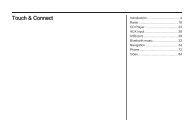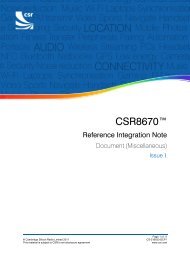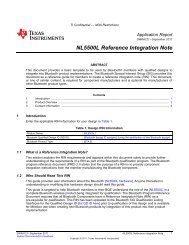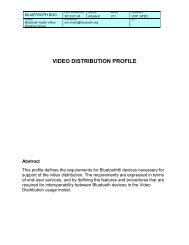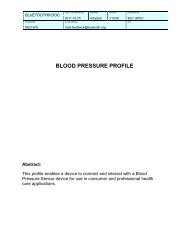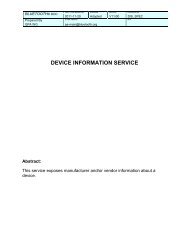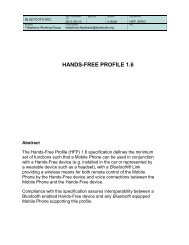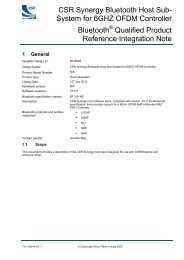Open Reference Integration Notes (RIN) - Bluetooth
Open Reference Integration Notes (RIN) - Bluetooth
Open Reference Integration Notes (RIN) - Bluetooth
Create successful ePaper yourself
Turn your PDF publications into a flip-book with our unique Google optimized e-Paper software.
X-GOLD<br />
Next Generation Mobile Phone Baseband Products<br />
X-GOLD 223, X-GOLD 225<br />
GSM/GPRS and EDGE-RX Single Chip with Integrated RF Transceiver, Power Management<br />
Unit, <strong>Bluetooth</strong> 4.0, Stereo FM RDS Receiver and Transmitter<br />
PMB 8818, PMB 8819<br />
<strong>Bluetooth</strong>* 4.0 + High Speed<br />
802.11 PAL<br />
X-GOLD 223 V2.x, X-GOLD 225 V1.x<br />
X-GOLD 223, X-GOLD 225<br />
XMM2230, XMM2250<br />
Application Note<br />
<strong>Bluetooth</strong> High Speed <strong>RIN</strong><br />
Revision 1.0, 2012-10-01<br />
Intel Mobile Communications
INFORMATION IN THIS DOCUMENT RELATED TO THE INTEL PRODUCT OR, IF ANY, RELATED TO ITS USE IS PROVIDED IN CONNECTION WITH INTEL<br />
PRODUCTS. NO LICENSE, EXPRESS OR IMPLIED, BY ESTOPPEL OR OTHERWISE, TO ANY INTELLECTUAL PROPERTY RIGHTS IS GRANTED BY THIS<br />
DOCUMENT. EXCEPT AS PROVIDED IN AGREEMENTS CONCLUDED INDIVIDUALLY OR INTEL’S TERMS AND CONDITIONS OF SALE FOR SUCH<br />
PRODUCTS, INTEL ASSUMES NO LIABILITY WHATSOEVER AND INTEL DISCLAIMS ANY EXPRESS OR IMPLIED WARRANTY, RELATING TO SALE AND/OR<br />
USE OF INTEL PRODUCTS INCLUDING LIABILITY OR WARRANTIES RELATING TO FITNESS FOR A PARTICULAR PURPOSE, MERCHANTABILITY, OR<br />
INF<strong>RIN</strong>GEMENT OF ANY PATENT, COPYRIGHT OR OTHER INTELLECTUAL PROPERTY RIGHT.<br />
UNLESS OTHERWISE AGREED IN WRITING BY INTEL, THE INTEL PRODUCTS ARE NOT DESIGNED NOR INTENDED FOR ANY APPLICATION IN WHICH<br />
THE FAILURE OF THE INTEL PRODUCT COULD CREATE A SITUATION WHERE PERSONAL INJURY OR DEATH MAY OCCUR.<br />
Unless otherwise agreed upon, Intel may make changes to specifications and product descriptions at any time, without notice. Designers must not rely<br />
on the absence or characteristics of any features or instructions marked “reserved” or “undefined”. Intel reserves these for future definition and shall<br />
have no responsibility whatsoever for conflicts or incompatibilities arising from future changes to them. Unless otherwise agreed, the information here<br />
is subject to change without notice. Do not finalize a design with this information.<br />
Contact your local Intel sales office or your distributor to obtain the latest specifications and before placing your product order.<br />
Copies of documents which have an order number and are referenced in this document, or other Intel literature, may be obtained by calling 1-800-<br />
548-4725, or go to: http://www.intel.com/#/en_US_01.<br />
Any software source code reprinted in this document is furnished under a software license and may only be used or copied in accordance with the<br />
terms of that license.<br />
This document contains information on products in the design phase of development.<br />
Intel processor numbers are not a measure of performance. Processor numbers differentiate features within each processor family, not across different<br />
processor families. Go to: http://www.intel.com/products/processor%5Fnumber/.<br />
Code Names are only for use by Intel to identify products, platforms, programs, services, etc. (“products”) in development by Intel that have not been<br />
made commercially available to the public, i.e., announced, launched or shipped. They are never to be used as “commercial” names for products. Also,<br />
they are not intended to function as trademarks.<br />
SMARTI, SMARTi & Device, BlueMoon, Comneon, Comneon & Device, M-GOLD, S-GOLD, E-GOLD, A-GOLD, X-GOLD, XMM, X-PMU, XPOSYS are<br />
trademarks of Intel Mobile Communications GmbH and related companies.<br />
Copyright © 2012, Intel Corporation. All rights reserved.<br />
*Other names and brands may be claimed as the property of others.<br />
The template (Word) of this document has been formally released by DOC department (IMC-DOC@intel.com).<br />
Template data: IMC_Template.dot, 01-Feb-2012
X-GOLD 223, X-GOLD 225<br />
PMB 8818, PMB 8819<br />
Revision History<br />
Page or Item Subjects (major changes since previous revision)<br />
Revision 1.0, 2012-10-01<br />
Initial version<br />
Template: IMC_Template_2011-03-02.dot
X-GOLD 223, X-GOLD 225<br />
PMB 8818, PMB 8819<br />
Table of Contents<br />
Table of Contents<br />
Introduction ............................................................................................................................................... 7<br />
1 Product Type Declaration.......................................................................................................... 8<br />
2 Hardware Overview .................................................................................................................. 8<br />
3 Standard Operating Conditions ................................................................................................. 8<br />
4 Application ............................................................................................................................... 8<br />
5 Block Diagram........................................................................................................................... 9<br />
6 Hardware Features ................................................................................................................... 9<br />
7 Radio Modules.......................................................................................................................... 9<br />
8 Interfaces ............................................................................................................................... 10<br />
9 Application Requirements....................................................................................................... 10<br />
10 Pin Description ....................................................................................................................... 10<br />
11 Bill of Material........................................................................................................................ 11<br />
12 Contact Information................................................................................................................ 11<br />
Application Note 4 Revision 1.0, 2012-10-01<br />
<strong>Bluetooth</strong> High Speed <strong>RIN</strong>
X-GOLD 223, X-GOLD 225<br />
PMB 8818, PMB 8819<br />
List of Figures<br />
List of Figures<br />
Figure 1 Block Diagram of <strong>Bluetooth</strong> High Speed in XMM2230 .....................................................................9<br />
Application Note 5 Revision 1.0, 2012-10-01<br />
<strong>Bluetooth</strong> High Speed <strong>RIN</strong>
X-GOLD 223, X-GOLD 225<br />
PMB 8818, PMB 8819<br />
List of Tables<br />
List of Tables<br />
Table 1 Design <strong>RIN</strong> Information........................................................................................................................7<br />
Table 2 Operating Range ..................................................................................................................................8<br />
Table 3 Pin Description for <strong>Bluetooth</strong> Block...................................................................................................10<br />
Application Note 6 Revision 1.0, 2012-10-01<br />
<strong>Bluetooth</strong> High Speed <strong>RIN</strong>
X-GOLD 223, X-GOLD 225<br />
PMB 8818, PMB 8819<br />
Product Type Declaration<br />
Introduction<br />
This document forms the <strong>Reference</strong> <strong>Integration</strong> Note for the 802.11 PAL implementation in X-GOLD 223, a<br />
GSM/GPRS and EDGE-RX Single Chip with Integrated RF Transceiver, Power Management Unit, Stereo FM<br />
RDS Receiver and Transmitter. Anyone interested in designing a mobile phone with this component should read<br />
this guide.<br />
The 802.11PAL implementation is part of the SYNERGY stack 18.2.4 from Cambridge Silicon radio (CSR).<br />
Table 1<br />
Design <strong>RIN</strong> Information<br />
Product Name: X-GOLD 223, X-GOLD 225<br />
<strong>Bluetooth</strong> Qualified<br />
Design ID (QD ID):<br />
<strong>Bluetooth</strong> Product Type:<br />
B020098<br />
Component (only 802.11 PAL)<br />
Design Model number: PMB8818, PMB 8819<br />
Hardware Version: PMB 8818 2.3, PMB 8819 1.0<br />
Software Version: 18.2.4<br />
This guide is targeted to help a <strong>Bluetooth</strong> Member or their BQE understand the role of the <strong>Bluetooth</strong> Transceiver<br />
in X-GOLD 223 in a complete mobile phone. The <strong>Bluetooth</strong> Program <strong>Reference</strong> Document requires that all<br />
<strong>Bluetooth</strong> Components have a <strong>Reference</strong> <strong>Integration</strong> Note (<strong>RIN</strong>) as a pre-requisite for qualification. This <strong>RIN</strong><br />
has been uploaded to the <strong>Bluetooth</strong> SIG Qualification Listing Interfaces for the Qualified Design ID B020098<br />
prior to qualification of this design and is available for Member use for their product implementation.<br />
Additionally refer to the <strong>Bluetooth</strong> Design Guide for X-GOLD 223 which provides more detailed information<br />
and which is available under NDA.<br />
The 802.11 PAL in X-GOLD 225 is identical to the one in X-GOLD 223. This document applies to both devices<br />
accordingly. The differences between both products concern other functions of the mobile phone.<br />
Application Note 7 Revision 1.0, 2012-10-01<br />
<strong>Bluetooth</strong> High Speed <strong>RIN</strong>
X-GOLD 223, X-GOLD 225<br />
PMB 8818, PMB 8819<br />
Product Type Declaration<br />
1 Product Type Declaration<br />
This product is listed as <strong>Bluetooth</strong> Component Product. If you use this product to implement <strong>Bluetooth</strong> in your<br />
mobile phone, further qualification and listing is required in accordance with the <strong>Bluetooth</strong> Qualification Process<br />
(ref. PRD 2.0). To start the process for a new qualification, please visit https://bluetooth.org/TPG/.<br />
2 Hardware Overview<br />
X-GOLD TM 223 (PMB8818) is a GSM/GPRS and EDGE-RX Single Chip with Integrated RF Transceiver, Power<br />
Management Unit, Stereo FM RDS Receiver and Transmitter and embedded <strong>Bluetooth</strong> 4.0 controller.<br />
Intel’s mobile phone platform XMM2230 is using X-GOLD 223 together with the 802.11AMP CSR 6030<br />
and the SYNERGY stack from CSR to implement <strong>Bluetooth</strong>4.0+High Speed.<br />
3 Standard Operating Conditions<br />
Table 2<br />
Operating Range<br />
Parameter Symbol Min. Typ. Max. Unit<br />
Case temperature TC -25 - 85 °C<br />
Supply voltage on<br />
pins connected to<br />
battery under bias<br />
VBAT 3.05 - 5.1 V<br />
4 Application<br />
X-GOLD 223 is a GSM, GPRS and EDGE-RX (EDGE-TX with external TX transceiver) baseband<br />
controller. It has an integrated RF transceiver, Power Management Unit, Audio Front-End, <strong>Bluetooth</strong><br />
and a FM Radio RX/TX with RDS. In addition to the modem functionality, X-GOLD 223 provides a<br />
rich set of multimedia extensions to enable todays and future Entry Phone applications. It is designed<br />
as a single chip solution, to meet the ever increasing demands of the GSM, GPRS and EDGE cellular<br />
subscriber market for Entry Phone and Ultra Low Cost terminals.<br />
A mobile phone reference design is available under the platform name XMM2231.<br />
Application Note 8 Revision 1.0, 2012-10-01<br />
<strong>Bluetooth</strong> High Speed <strong>RIN</strong>
X-GOLD 223, X-GOLD 225<br />
PMB 8818, PMB 8819<br />
Block Diagram<br />
5 Block Diagram<br />
The following figure shows a block diagram of the <strong>Bluetooth</strong> High Speed Implementation in the XMM2230<br />
mobile phone platform:<br />
A <strong>Bluetooth</strong> 4.0+High Speed End Product Listing of a mobile phone with XMM 2230 will use the following<br />
elements:<br />
1. SYNERGY stack 18.2.x from CSR (QDID B018638) running on the main CPU of the X-GOLD 223<br />
2. The 802.11 PAL QDL for which this <strong>RIN</strong> was created (B020098)<br />
3. The integrated <strong>Bluetooth</strong> 4.0 controller in X-GOLD 223 (QDID B018991)<br />
4. The 802.11 AMP device CSR 6030 WiFi certification ID WFA16381<br />
Figure 1<br />
Block Diagram of <strong>Bluetooth</strong> High Speed in XMM2230<br />
6 Hardware Features<br />
For X-GOLD 223<br />
Technology:<br />
− SoC, Monolithic, 65 nm CMOS<br />
Package:<br />
− LF2BGA, 10 x 10 x 1.0 mm<br />
− 0.5 mm pitch<br />
− 235 placable balls<br />
− Low cost PCB technologies targeted<br />
7 Radio Modules<br />
For X-GOLD 223<br />
− GSM, GPRS and EDGE-RX (EDGE-TX with external TX transceiver) baseband controller<br />
− Integrated <strong>Bluetooth</strong> 4.0 controller (incl. LE)<br />
− FM Radio RX/TX with RDS<br />
Application Note 9 Revision 1.0, 2012-10-01<br />
<strong>Bluetooth</strong> High Speed <strong>RIN</strong>
X-GOLD 223, X-GOLD 225<br />
PMB 8818, PMB 8819<br />
Interfaces<br />
8 Interfaces<br />
− 3-wire WLAN coexistence with Packet Type Arbitration<br />
− Virtual UART for HCI to internal Host, parallel interface for higher throughput<br />
(Can be routed to external UART for qualification and test)<br />
− I2S interface to internal Audio block<br />
(Can be routed to external I2S/PCM interface for test purposes)<br />
9 Application Requirements<br />
<strong>Bluetooth</strong> High Speed requirements:<br />
The implementation of <strong>Bluetooth</strong> High Speed in the mobile phone requires the use and licensing of the SW and<br />
HW elements of the platform described in chapter 5 Block Diagram.<br />
<strong>Bluetooth</strong> and WLAN share the same antenna through a BT/WLAN Front End Module.<br />
<strong>Bluetooth</strong> requirements:<br />
The <strong>Bluetooth</strong> host is implemented on the main CPU of X-GOLD 223.<br />
The host controls a WLAN device through an SPI interface. The WLAN coexistence interface allows for antenna<br />
arbitration by the WLAN device. This enables the implementation of <strong>Bluetooth</strong> “High Speed” applications.<br />
The <strong>Bluetooth</strong> controller is a BR/EDR and LE dual mode device, which enables implementation of “<strong>Bluetooth</strong><br />
smart” applications.<br />
The BT RF interface is a single ended 50 Ohm input/output port. The use of a band pass filter for the ISM band<br />
is recommended.<br />
An external antenna is required. The BT component has been qualified for an antenna gain up to 2.5 dB.<br />
For more detailed implementation requirements, including layout recommendations, please refer to the<br />
<strong>Bluetooth</strong> Design Guide for X-GLD 223.<br />
10 Pin Description<br />
The following table explains the pins of the <strong>Bluetooth</strong> block only.<br />
Table 3 Pin Description for <strong>Bluetooth</strong> Block<br />
Name Pad Type Description Ball<br />
Functional Mode<br />
BT_RFIO ANA BT antenna<br />
BT_RFIOX2 ANA GND BT RF clean<br />
BT_RFIOX ANA GND BT RF clean<br />
VDD_BT_RF SUP BT RF LDO<br />
VSS_BT_RF SUP GND BT RF clean<br />
VDD_BT_1V8RF SUP BT RF 1.8 V clean (from PMU)<br />
VDD_BT_1V8DIG SUP BT RF 1.8 V dirty (from PMU)<br />
VSS_BT_DIG SUP GND BT RF dirty<br />
Note that clocks and power supplies are taken from the clock generation unit and power management unit of the<br />
mobile phone controller. Details on the complete mobile phone system can be found in the data sheet which is<br />
available under NDA.<br />
Details on the 802.11 AMP and the FEM are available from CSR.<br />
Application Note 10 Revision 1.0, 2012-10-01<br />
<strong>Bluetooth</strong> High Speed <strong>RIN</strong>
X-GOLD 223, X-GOLD 225<br />
PMB 8818, PMB 8819<br />
Bill of Material<br />
11 Bill of Material<br />
The 802.11 AMP is implemented by a CSR 6030 component.<br />
For the BT / WLAN Front-End Module, SE2602T can be used.<br />
The BT RF interface is a single ended 50 Ohm input/output port.<br />
The use of a band pass filter for the ISM band is recommended.<br />
12 Contact Information<br />
Information on Intel <strong>Bluetooth</strong> products can be found on the Internet page of Intel Mobile Communications:<br />
http://www.intel.com/products/wireless/mobilecommunications/bluetooth/browsebyprods.htm.<br />
This page provides links to find a local distributor or point of contact to Intel Mobile Communications.<br />
Application Note 11 Revision 1.0, 2012-10-01<br />
<strong>Bluetooth</strong> High Speed <strong>RIN</strong>


